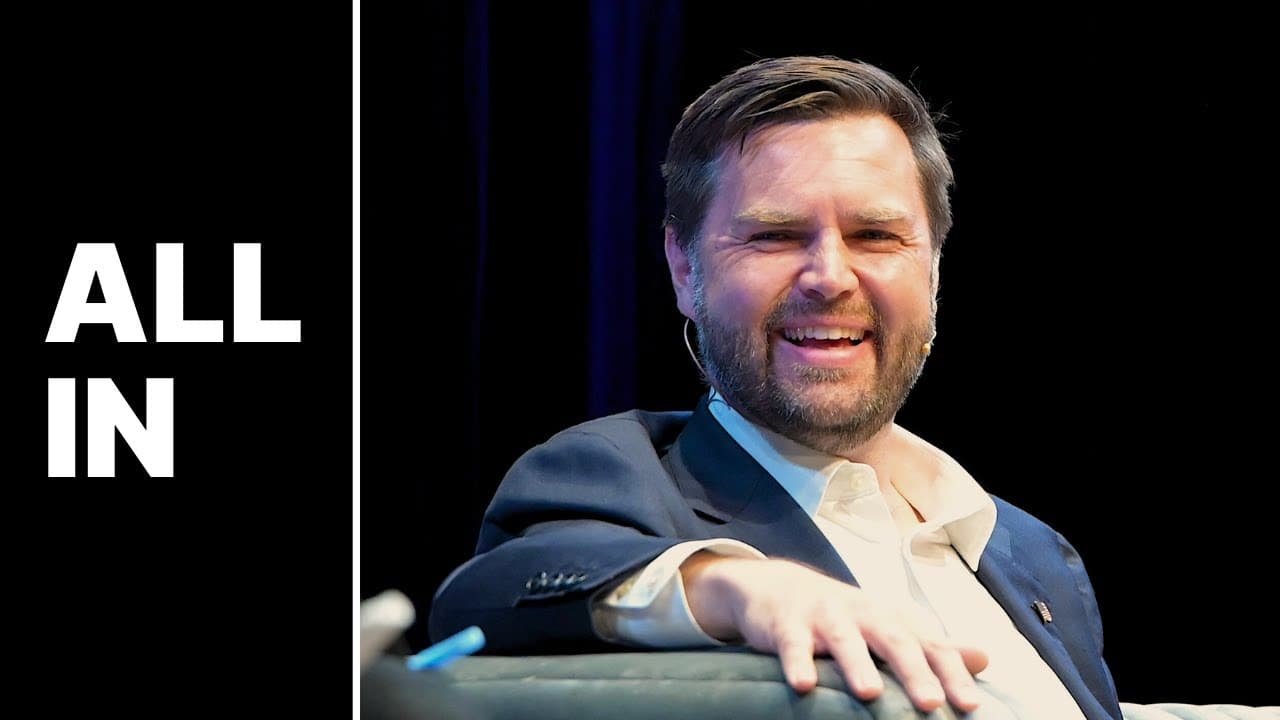In conversation with JD Vance | All-In Summit 2024
10 Sep 2024 (1 year ago)

J.D. Vance's Background and Qualifications
- Zach describes J.D. Vance as someone who had the courage to serve in the Marines but also the wisdom to recognize when America shouldn't engage in war. (2m0s)
- Zach highlights J.D. Vance's understanding of both the tech industry and the struggles of people from impoverished areas like Appalachia. (2m54s)
- J.D. Vance is running for Vice President and believes there's a link between poverty and lack of innovation in the American economy. (3m21s)
Donald Trump's Presidency and Policies
- Donald Trump never called white supremacists "very fine people" after Charlottesville, it was a fabrication by the American media. (6m16s)
- During Trump's four years as president, wages for workers grew faster than the size of government and corporate profits. (6m57s)
- Donald Trump's vice president would aim to support the president's agenda and ensure the executive branch aligns with the president's policy decisions. (16m3s)
- Donald Trump is deeply interested in the specifics of public policy and how they impact the real economy. (45m16s)
Election Integrity and Debate
- The speaker would have asked states to submit alternative slates of electors to allow for debate about the election results. (10m16s)
Government Spending and Procurement
- The United States government spends between 100 billion and 600 billion dollars per year on illegal aliens, through healthcare benefits, section 8 housing, Social Security fraud, and Medicare fraud. (13m44s)
- The government procurement process, especially for military equipment, is broken, resulting in equipment that is not as good as it should be and costs more than it should. (15m14s)
- To improve the procurement process, the president and vice president must be willing to challenge powerful defense contractors. (15m36s)
Executive Orders and Policy Changes
- The speaker believes that executive orders offer a significant avenue for enacting policy changes, both positively and negatively, citing border control as an example. (18m36s)
Political Realignments and Wealth Distribution
- The speaker observes a shift in political alignments, noting Dick Cheney's endorsement of Kamala Harris and Bobby Kennedy's endorsement of Donald Trump, highlighting a potential realignment of traditional political allegiances. (20m27s)
- Bobby Kennedy's perspective on wealth distribution in America is that 30 years ago, 80% of the wealth in American counties that voted Republican and 20% went to counties that voted Democrat. Now, 70% goes to Democrat counties and 30% to Republican counties. (21m34s)
Political Donations and Tech Industry Alignment
- In 2012, Wall Street donations favored Romney over Obama 3 to 1, Clinton over Trump 4 to 1 in 2016, and Biden over Trump 9 to 1 in 2020. (22m1s)
- Big Tech companies like Facebook and Google are pro-Democrat, while smaller tech companies, startups, and crypto companies are more likely to be pro-Republican. (23m0s)
Immigration and the Social Contract
- Ronald Reagan enacted a large amnesty program in 1986 that aimed to address the issue of undocumented immigrants already residing in the US and to create a more skill-based immigration system. (26m57s)
- The current immigration system is broken due to the presence of 25 million undocumented immigrants, making it challenging to implement meaningful changes to legal immigration policies. (26m40s)
- The influx of a large number of undocumented immigrants undermines the social contract by straining social safety net programs and creating divisions among citizens. (27m54s)
Southern Border Crisis and Immigration Policies
- Kamala Harris's policies are blamed for the current situation at the Southern Border. (34m46s)
- It is suggested that taxing remittances would encourage people to return to their country of origin. (34m9s)
- The speaker believes that deportations should begin by targeting migrants who have committed violent crimes. (33m45s)
- People from Iran and other countries in Asia and Africa are entering the United States through the southern border. (35m23s)
Trade with China and Economic Growth
- The current trade relationship between the United States and China is unbalanced, with the United States borrowing money from China to buy goods produced in China. (38m54s)
- Increasing US economic growth to 4-5% will lead to widespread prosperity. (39m42s)
- The United States could achieve higher economic growth by significantly reducing regulatory burdens in sectors like transportation, energy, and home construction. (40m21s)
Manufacturing and Economic Strength
- The manufacturing of products and the design of products are deeply interconnected, and a strong economy requires domestic manufacturing capabilities. (42m2s)